1. 2022 Historical Event…Bonds Down More Than Stocks.
Michael Gayed Below are the top 20 largest peak to trough drawdowns for the S&P 500 going back to 1961. Never, IN HISTORY, in an EXTREME drawdown for stocks, have Treasuries, THE risk-off asset, GONE DOWN MORE THAN STOCKS.
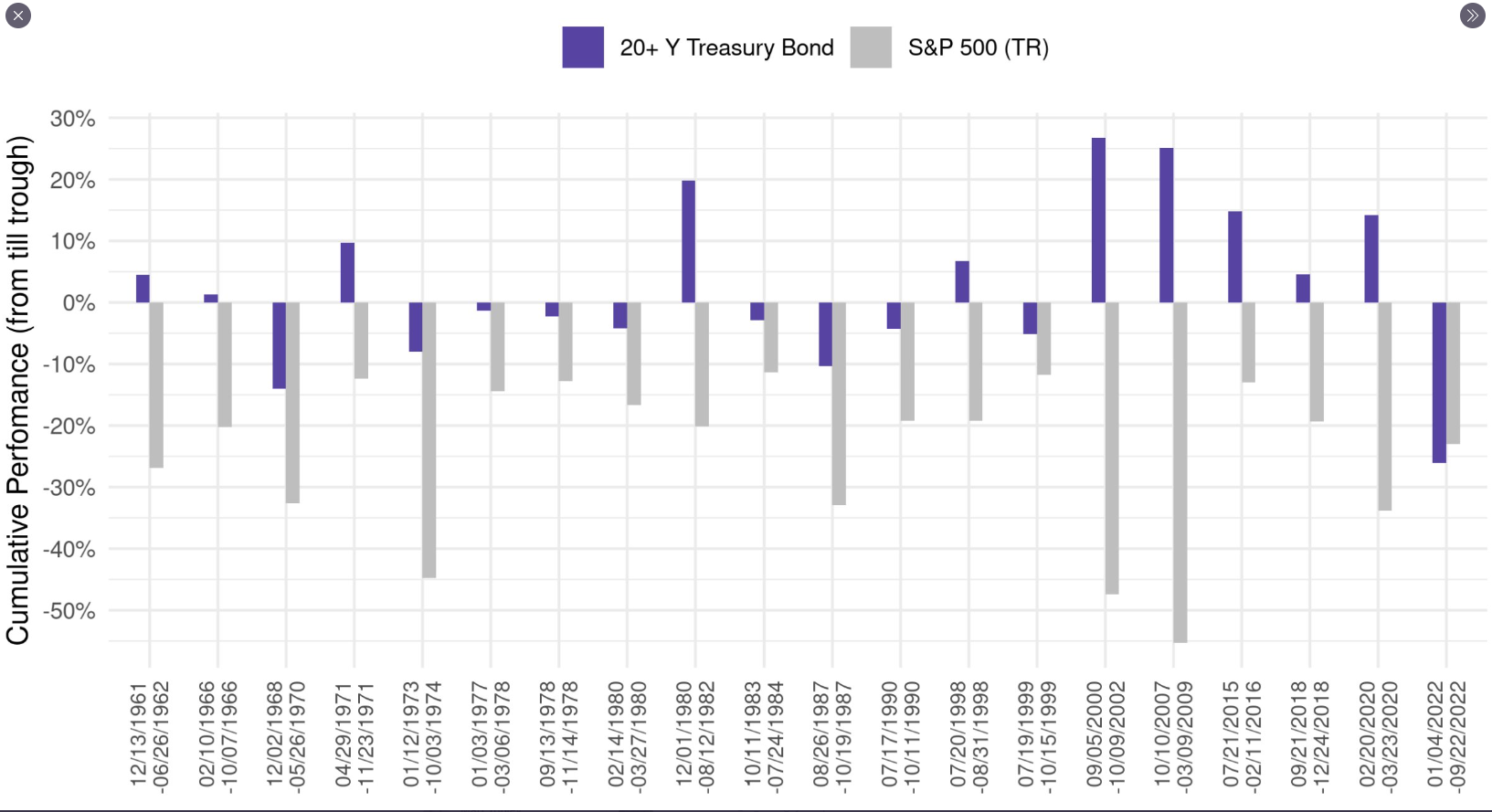
2. 30 Year Treasury -30% from Highs
30 year treasury ETF …oversold short-term
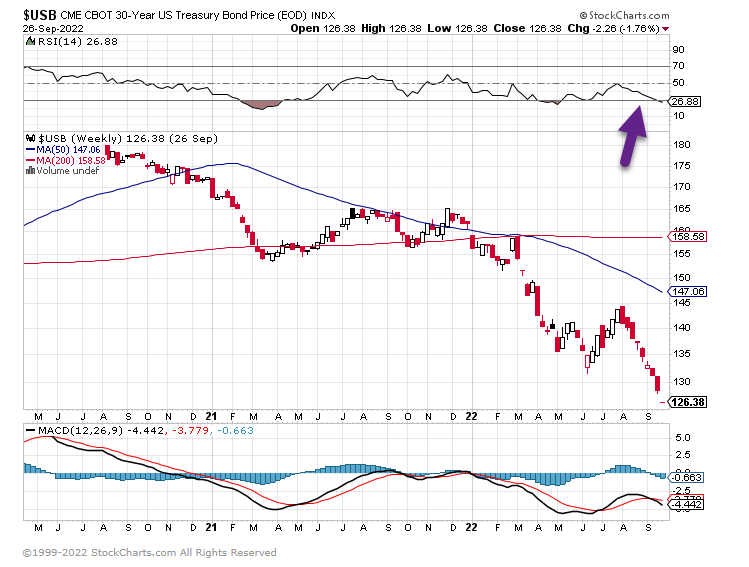
First time American investors experiencing a “short-term safe bond fund” chart that looks like BSV
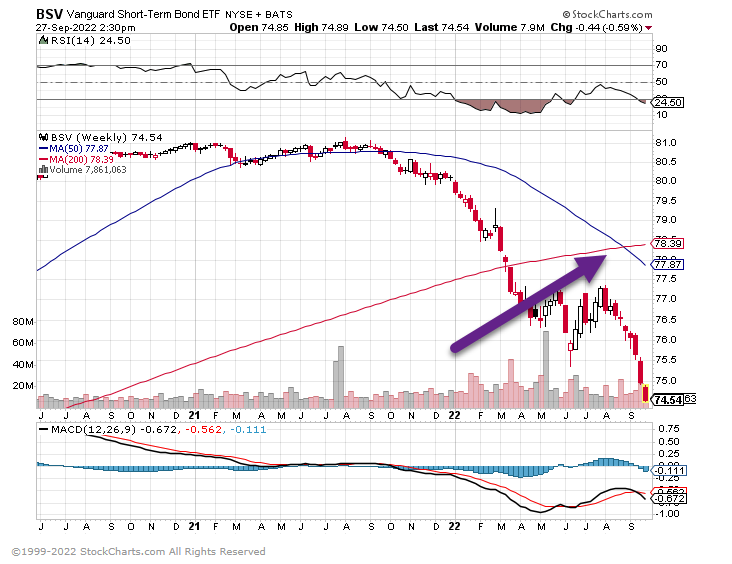
3. Hockey Stick Spike in Put Option Hedging
From Dave Lutz at Jones Trading–You can practically smell the fear. Single stock put premium has been surging to record levels! (FT via the Twits)

4. U.S. is Facing Shortest Lead Time Ever Between Inverted Yield Curve and Recession
@Charlie Bilello Back then, the expansion peaked in March 2001. Today, many believe we are already in a recession.

If that’s the case, it would be the shortest lead time we’ve seen from the inverted yield curve signal.

5. Amazon Market Cap in S&P Almost Cut in Half

https://www.linkedin.com/in/jonathanbaird88/
6. FANG Stock ETF Closes Below 200 Week Moving Average.
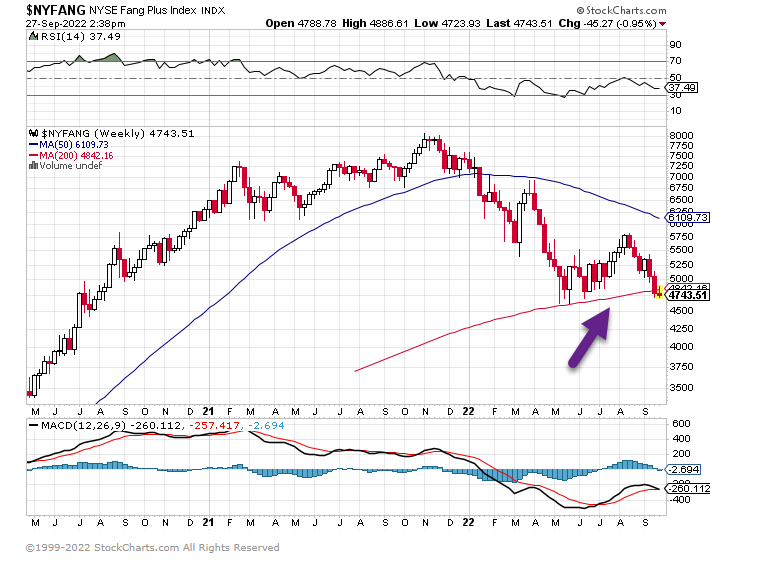
7. S&P Retail Index Closes Below 200 Week Moving Average
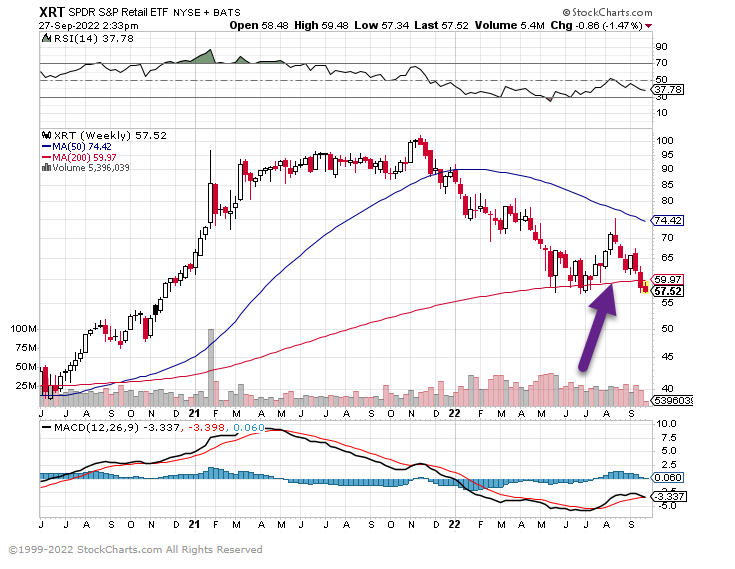
8. China vs. India…Straight Down
This chart shows China ETF vs. India ETF….China straight pattern down vs. India starting in 2021
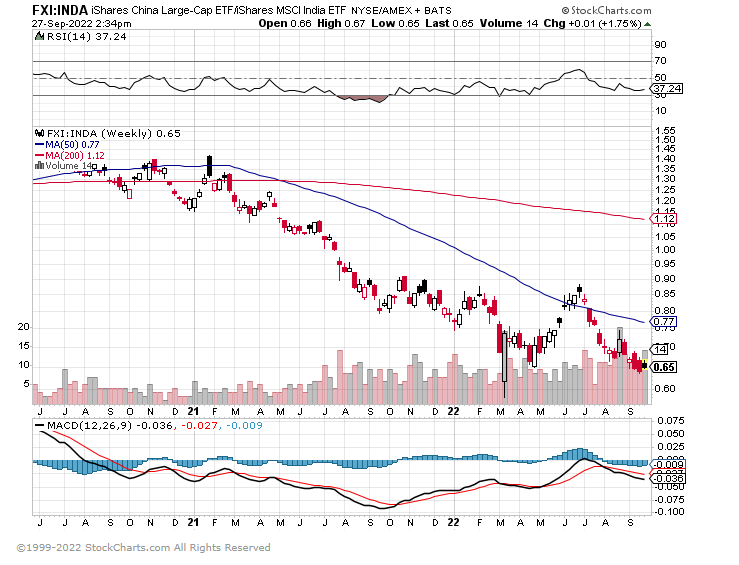
9. New fully self-driving Volkswagen allows you to work, eat and SLEEP
Cody Carlson VOLKSWAGEN has shown us the future of transport with its fully self-driving GEN.TRAVEL vehicle.
The all-electric GEN.TRAVEL car operates at the highest self-driving level and acts as an alternative to short-haul flights.

Rearview image showcasing Volkswagen’s GEN.TRAVEL vehicleCredit: Volkswagen AG
The Society of Automotive Engineers [SAE] formed a ranking system for self-driving car automation in 2014.
These autonomous (or self-driving) rankings are leveled from 0 to 5, with level 5 being the highest.
Volkswagen’s GEN.TRAVEL vehicle has level 5 autonomy, meaning it can travel through bad weather and isn’t limited to specific geographical locations, according to the manufacturer.
GEN.TRAVEL’s interior is customizable for each journey, offering configurations for working, eating, and sleeping.
The fully self-driving vehicle’s work setup includes a conference layout with four seats and a large center table where passengers can work and eat.
Illuminating GEN.TRAVEL’S work environment is dynamic lighting that helps passengers avoid motion sickness.
GEN.TRAVEL riders looking to catch some rest can convert the four chairs into two flat-lying beds.
The dynamic lighting within this Volkswagen also induces passenger melatonin release to promote better rest.
https://www.the-sun.com/
10. The Science of Weekend Recovery
Finding your own best way to recover from the work week—and go back stronger. Jeffrey Davis M.A.
KEY POINTS
- Many Americans are spending weekends and holidays working, leading to negative work-related stress.
- Unwinding on the weekend is important, but how we choose to unwind is equally important.
- The right form of recovery for you depends on the nature of your work.
Does it feel like it’s more difficult to disengage from work these days? If so, you’re not alone. According to the latest American Time Use Survey, one in five American workers spends an average of 5.94 hours working on weekends and holidays.
Working on the weekends is the message society tells us about how to get ahead. A Google search of what entrepreneurs do on weekends returns cheerful articles filled with advice to unwind and relax—yet Quora and Reddit forums asking the same question reveal what entrepreneurs actually do: work on their businesses.
Is it any wonder that the American Psychological Association’s 2021 Work and Well-being Survey found three in five workers are experiencing negative work-related stress?
It’s time to reclaim our weekends.
Recent Research on Weekend Recovery
Earlier this year I wrote about setting goals for a life worth living outside of work and how, if we want to avoid burnout and improve our resilience, we need to rethink how we refresh ourselves while off the clock.
Since writing that piece, I’ve become curious about a pair of studies that go beyond the fact that relaxation is necessary and ask the question of which type of activity can help us feel the most rejuvenated.
In a 2017 study from San Francisco University, Kevin J. Eschleman and his colleagues found that workers in less-creative jobs (such as cashiers, security guards, and technicians) were more likely to benefit from creative activities outside of work. Workers in creative jobs such as designers and architects, on the other hand, were more refreshed by noncreative pursuits.
A more recent study from the Université Grenoble Alpes in France extended the question to look at not only the activities participants did but also the amount of effort those activities took and the way they made the participant feel (which they call “experiences”; e.g., relaxation, mastery, control).
They found that participants who engaged in activities related to their work experienced lower recovery over the weekend, while those who engaged in social, physical, and creative experiences recovered better. Digging even deeper, they discovered that two specific experiences—psychological detachment from work and relaxation—were more likely to assist with recovery.
I want to highlight this for the one in five of us who are working 5.94 hours on weekends and holidays: the more distinct your nonwork activities are from your work activities, the more recovered you will feel at the end of your weekend.
Complementary Work and Recovery
Given this, how should you be spending your weekends? What you find most restorative will depend on the nature of your work.
article continues after advertisement
Because so much of my work throughout the week is cerebral and done at a computer, I find that activities that are outdoors and physically engaging are incredibly restorative—even if they’re technically “labor.” A few weekends ago I spent the weekend stacking two cords of wood at our home, then helped a friend spread cedar chips. I ended up sore, but happy and refreshed.
I’ve seen similar stories from clients who have chosen to engage in recreative activities that complement their work.
- One client, a tenured law professor, turned to painting to relieve stress, refresh her spirits, and spark her creativity. For several winter months, she awoke early and painted a small watercolor with soil paints. The pursuit opened up new creative avenues for her; she wrote a book to inspire other lawyers.
- Another client, a writer, chooses a sewing or woodworking project when she needs a break from wordsmithing. She says it engages her creativity in a different way, engaging the problem-solving and engineering part of her brain and allowing her to come back to her creative writing refreshed.
Whatever the activity, it seems participation is a key factor in how it affects us. A 2014 study followed two cohorts in 10-week classes. One group was given art lessons and actively produced paintings, while the other only viewed and discussed art. The group that produced art saw increased connectivity in the brain’s default mode network, which can improve our ability to be creative and imaginative.
Your Own Best Weekend Recovery
Which activities will help you recover best over the weekend? Start by asking yourself the following questions.
1. What is the mental nature of your work?
Those in noncreative jobs should look for ways to explore their creativity on the weekends, such as taking up a new hobby.
article continues after advertisement
If you’re in a creative field, try giving your mind a few days to recover while you engage in physical work, or a complementary hobby that lights up other parts of your brain besides what you use in your work.
2. What is the physical nature of your work?
For those of us who spend our days physically sitting at a computer or desk, activities that get our bodies moving can be good recovery. Those who are more active throughout the week might find stillness to be the best thing for them.
Think about your environment. Do you spend most of your work week in an office or in the city? Try an activity that gets you into a natural environment. Do you spend your days in a home office? Try an activity that gets you out into a more social space.
3. What is the social nature of your work?
Changing up who you interact with throughout the week can also make a difference. If most of your work is solo, consider taking a weekend class or going on an outing with friends. If you spend your week in meetings, maybe a solo hike or a morning spent reading are just what you need to unwind.
Whatever activity you choose, I encourage you to experiment with your weekends and vary the pattern of your recovery to learn how you can best show up refreshed on Monday morning.
https://www.psychologytoday.